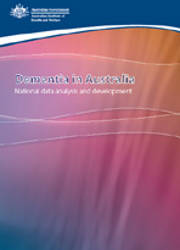Summary
Dementia describes a syndrome associated with a range of diseases which are characterised by the impairment of brain functions, including language, memory, perception, personality and cognitive skills. The International Statistical Classification of Diseases and Related Health Problems (ICD), 10th Revision (WHO 1992a:312) defines dementia as:
a syndrome due to disease of the brain, usually of a chronic or progressive nature, in which there is disturbance of multiple higher cortical functions, including memory, thinking, orientation, comprehension, calculation, learning capacity, language, and judgement. Consciousness is not clouded. The impairments of cognitive function are commonly accompanied, and occasionally preceded, by deterioration in emotional control, social behaviour, or motivation. This syndrome occurs in Alzheimer’s disease, in cerebrovascular disease, and in other conditions primarily or secondarily affecting the brain.
Dementia is not a single specific disease and therefore affects people differently and with varying impact of their families and carers. Dementia is not a natural part of ageing, although most people with dementia are older. After the age of 65 the likelihood of living with dementia doubles every five years and it affects 24% of those aged 85 and over (Henderson & Jorm 1998).
Because Australia’s population is ageing, there has been growing recognition that dementia represents a significant challenge to health, aged care and social policy. This report estimates that the number of people with dementia will grow from over 175,000 in 2003 to almost 465,000 in 2031, assuming the continuation of current dementia age-specific prevalence rates. Governments at national and state level are developing responses to the challenges posed by dementia, through initiatives such as the Australian Government’s Helping Australians with dementia, and their carers—making dementia a National Health Priority.
In 2004 the Australian Government Department of Health and Ageing commissioned the Australian Institute of Health and Welfare to undertake the present study to provide a profile of the Australian population who experience dementia and to review the availability and quality of data about dementia. An important objective of the report is to provide a guide for improving national dementia data by identifying possible data elements that would be suitable for inclusion in a range of data collection contexts. Recommendations for these data elements are presented as areas of information and options for potential data element sets that are considered vital to collecting relevant, informative and comparable data on dementia prevalence estimates, management and outcomes.
Preliminary material (218K PDF): Acknowledgments; Abbreviations; Overview
Section 1: Dementia definition, classifications and data sources (458K PDF)
1. Introduction
- Background
- Purpose of this report
- Structure of this report
2. Definition, diagnosis and classification of dementia
- Describing dementia
- Diagnosing dementia
- Defining and classifying dementia and its outcomes
- Conclusion
- Dementia data in Australian collections (318K PDF)
- Administrative collections
- Surveys
- Section 2: Dementia data analysis
3. Prevalence, incidence and burden of disease
- Summary
- Prevalence of dementia
- Prevalence by severity of dementia
- Incidence of dementia
- Burden of disease
4. Characteristics of people with dementia (379K PDF)
- Introduction
- Identification of dementia
- Sociodemographic characteristics
- Nature of the dementia syndrome
- Disability, health and need for assistance
- Sources of care
- Conclusion
5. Carers of people with dementia (303K PDF)
- What data are available?
- Carer availability
- Profile of carers
- The caring role
- Impact of the caring role on carers
- Support networks for carers
- Formal service use by carers
- Carer support and intervention
6. Use of health and aged care services (371K PDF)
- General practice
- Pharmaceutical Benefits Scheme and Repatriation Pharmaceutical Benefits Scheme
- Aged Care Assessment Program
- Community care
- Residential aged care
- Hospitals - admitted patient services
7. Expenditure on dementia (249K PDF)
- Health and aged care system expenditure on dementia for 2003
- Residential aged care services
- Hospital services
- Medical services
- Pharmaceuticals
- Community care services
- Projected expenditure
8. Strengths and limitations of dementia data
- Introduction
- Limitations of existing data
- Strengths of data
- Future directions
- Section 3: Dementia data development (459K PDF)
9. Developing dementia data standards
- Purpose
- Principles of data development
- Data standards
- Constraints that impact upon the collection of dementia data elements
- Who provides the information?
10. Comparison and mapping of data items
- Identifying people with dementia and cognitive impairment
- Severity of dementia and cognitive impairment
- Environmental factors
- Conclusion
11. Improving dementia data
- Data development methodology
- Dementia data collection levels
- Proposed data elements
- Recommendations for future data development
Appendix
Appendix: Expenditure method (577K PDF)
Appendix tables
End matter: References; List of tables; List of figures; List of boxes



